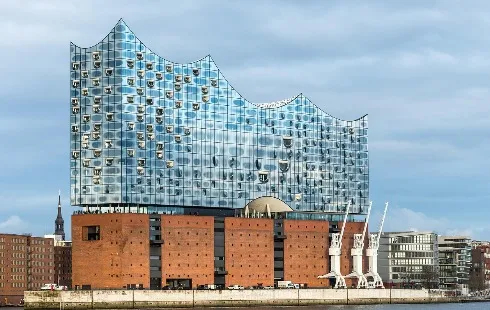
Trump's Tariff War: China Urges Immediate Repeal of Tariffs Amid Countermeasures
Section: News
 Google's decision to open its new headquarters at Posrpalast in Maxvorstadt, Munich, has created a mix of excitement and concern among the city's residents. The tech giant's expansion into the heart of the vibrant Maxvorstadt district promises 1500 new jobs and economic growth. However, this development has also sparked worries among Munich's residents, who fear that the emergence of "Silicon Maxvorstadt" or "Isar Valley" could exacerbate the already challenging housing situation in the city. In this article, we will delve into the potential impact of Google's new headquarters on rents, apartment availability, and the overall socio-economic landscape of Munich.
Google's decision to open its new headquarters at Posrpalast in Maxvorstadt, Munich, has created a mix of excitement and concern among the city's residents. The tech giant's expansion into the heart of the vibrant Maxvorstadt district promises 1500 new jobs and economic growth. However, this development has also sparked worries among Munich's residents, who fear that the emergence of "Silicon Maxvorstadt" or "Isar Valley" could exacerbate the already challenging housing situation in the city. In this article, we will delve into the potential impact of Google's new headquarters on rents, apartment availability, and the overall socio-economic landscape of Munich.
The Pros of Google's Presence
Google's arrival in Maxvorstadt is undoubtedly a significant milestone for both the company and the city. The infusion of 1500 new jobs in the technology sector is likely to bolster Munich's economy and enhance its status as a prominent European tech hub. The headquarters will attract highly skilled professionals and researchers, fostering innovation and knowledge-sharing within the community.
Moreover, Google's presence is expected to attract other tech companies, start-ups, and venture capitalists to the area. This influx of tech-related businesses could lead to a thriving ecosystem, creating a synergy that benefits the local economy and provides additional job opportunities for Munich's residents.
Furthermore, Google has a track record of investing in the communities where it operates. Through philanthropic initiatives, grants, and partnerships with local organizations, the company has the potential to contribute positively to Maxvorstadt's infrastructure, education, and cultural development.
The Housing Challenge
Despite the numerous advantages of Google's expansion, the apprehensions voiced by Munich's people are not without merit. The "Silicon Maxvorstadt" phenomenon could indeed exert pressure on the housing market, leading to further increases in rental prices and exacerbating the scarcity of affordable apartments.
Maxvorstadt, known for its bohemian atmosphere and vibrant arts scene, has already seen significant development and an influx of young professionals in recent years. This has, in turn, driven up rental prices and reduced the availability of affordable housing options. With the arrival of Google and the potential wave of tech employees and other related professionals, the demand for housing is likely to surge even further.
Such a scenario could make it increasingly challenging for average residents and low-income families to find affordable accommodation in the area. The risk of gentrification could become more pronounced, leading to the displacement of long-standing communities and changing the neighborhood's unique character.
Mitigating the Impact
Munich's city authorities and Google must work hand in hand to mitigate the negative effects of the housing situation. One possible solution is for Google to collaborate with local authorities and developers to invest in the construction of affordable housing units within or nearby the Maxvorstadt district. This would help create a more balanced housing market, ensuring that the influx of tech professionals does not completely overshadow the needs of the existing community.
Additionally, Google can implement sustainable transportation initiatives, such as subsidized public transit passes or shuttle services, to reduce the strain on the area's infrastructure caused by increased commuting.
Conclusion
Google's decision to open its new headquarters at Posrpalast in Maxvorstadt, Munich, has elicited both excitement and anxiety among the city's residents. The prospect of 1500 new jobs and the rise of a burgeoning tech hub is undoubtedly enticing for Munich's economy. However, the potential consequences of rising rents and a shortage of apartments pose valid concerns for the city's housing situation.
The success of Google's expansion into Maxvorstadt will depend on how effectively the company, local authorities, and the community collaborate to address these challenges. By taking proactive steps to invest in affordable housing and sustainable infrastructure, Google can contribute positively to the neighborhood while preserving its unique character. With careful planning and cooperation, "Silicon Maxvorstadt" could become a model for balanced urban development that benefits both the technology sector and the existing communities in Munich.

Section: News

Section: News

Section: Politics

Section: News

Section: News

Section: Politics

Section: Arts

Section: News

Section: News

Section: Business

Health Insurance in Germany is compulsory and sometimes complicated, not to mention expensive. As an expat, you are required to navigate this landscape within weeks of arriving, so check our FAQ on PKV. For our guide on resources and access to agents who can give you a competitive quote, try our PKV Cost comparison tool.

Germany is famous for its medical expertise and extensive number of hospitals and clinics. See this comprehensive directory of hospitals and clinics across the country, complete with links to their websites, addresses, contact info, and specializations/services.

Join us for the presentation of Dr. Felix Leibrock's latest book, Göttliches fühlen, where he explores the emotional experience as a pathway to happiness. This thought-provoking work addresses the challenge of believing in a higher power amidst overwhelming suffering. Can the divine be felt...
No comments yet. Be the first to comment!